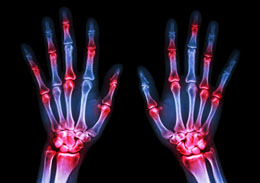Joint pain relief in arthritis has a substantial impact on the daily activities of an individual. It also helps in improving the overall quality of his life. What is the role of pain relief medication in arthritis management? Read on to find out.

Pain and Arthritis
Bones of a joint are covered with cartilage. It provides a cushion to the bones due to which the joint can move without pain. Arthritis causes cartilage damage and joint inflammation, leading to pain.
Arthritis is an illness that causes swelling, stiffness and pain in the joints of our body. Inflammation in the joint or the surrounding area leads to pain. There are more than 100 different types of arthritis affecting one or more joints of the body. Arthritis can affect the muscles and other organs too.
Whatever the cause or the target organ, pain is the most common symptom of arthritis. Pain is also the primary symptom of many other illnesses and hence pain relief is the basic and one of the most essential parts of treatment. Pain is the body's way of telling you that something is wrong. A chemical signal is generated in the affected area and is sent to the brain. The brain recognizes it as pain.
Pain management, also known as algiatry is a branch of medicine that deals with ways to relieve pain and improve the patients' quality of life. It employs techniques ranging from administration of medicines to relaxation techniques and psychotherapy. Here we discuss arthritis management through pain relief medication which primarily includes the use of:
- Analgesics
- NSAIDs
- COX-2 inhibitors
Arthritis pain can be acute or chronic, and most forms of arthritis reach a chronic form in the course of the disease. The pain affects overall health, limits body movement and can be very distressing. Many times, pain relief becomes the main concern for the patient rather than disease control.
Pain management plays an important role in breaking the vicious cycle of pain, stress and depression. Pain relief helps increase the mobility and bone strength by reducing discomfort in the joints. However, all forms of pain must be treated under strict medical supervision. Pain killers broadly prescribed for chronic pain relief are plain analgesics or NSAIDs (Non-steroidal anti-inflammatory drugs). In severe cases, steroids are administered under specialty physician care which provide temporary relief from arthritis symptoms.
Although analgesics help in pain relief, it is important to note that they do not control the disease. Painkillers, as the name suggests, provide pain relief and reduce inflammation. Some also help alleviate symptoms like fever and body ache. Thus, the selection of an ideal painkiller varies from person to person and also depends on the degree of joint inflammation.
In the absence of swelling, and if
pain is the only presenting symptom, an analgesic like tramadol or a paracetamol can be safely used. Non-steroidal anti-inflammatory drugs (NSAIDs) like ibuprofen, diclofenac, naproxen, indomethacin which come under different brand names worldwide, relieve pain by reducing inflammation. COX-2 inhibitors can be prescribed for individuals with arthritis. They are less likely to have gastrointestinal side effects that NSAIDs might have.
Analgesics have some common side effects like hyperacidity, abdominal pain, stomach ulcers and bleeding tendencies. In some cases, there can be swelling in the feet, hypertension and allergic rashes. It is important to educate the patients about arthritis care and proper counseling about the use of medicines is necessary. This helps strike a balance between the effects and side effects of the medicines being used.
Heat and cold therapy, massage (under expert guidance), relaxation and moderate exercise are effective ways of pain management in arthritis. Correct diagnosis and treatment are more important than symptomatic relief. Additional treatment comprising medicines, nutritional supplements and lifestyle changes is advisable for controlling the symptoms of arthritis and ensuring overall health of the individual.


